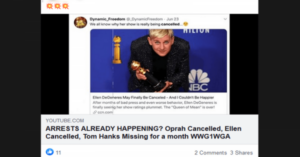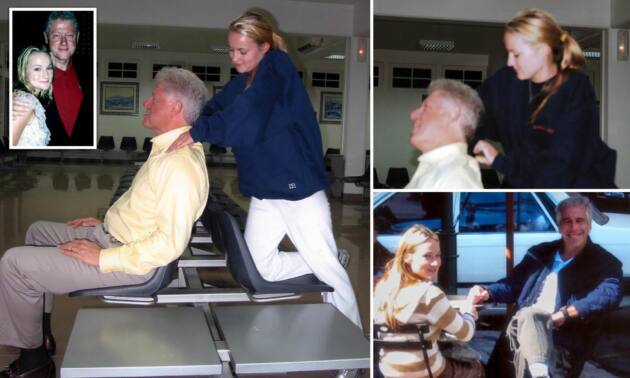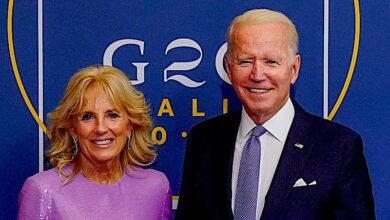Facebook removes thousands of Antifa, QAnon groups
Tech and social media giant Facebook has finally removed thousands of groups, pages, and ads related to Antifa, the violent fascist group that claims it is fighting fascism. Facebook also took down pages accused of spreading conspiracy theories and purporting to fight child-sex trafficking.
“For militia organizations and those encouraging riots, including some who may identify as Antifa, we’ve initially removed over 980 groups, 520 pages and 160 ads from Facebook,” the social media company said Wednesday in a statement. “We’ve also restricted over 1,400 hashtags related to these groups and organizations on Instagram.”
Facebook said those pages, groups, and Instagram accounts are tied to offline anarchist groups that support violent acts amidst protests.

The company didn’t elaborate on whether they’re referring to the current wave of violent protests and riots after the death of George Floyd.
The social media platform said that their scope of policy enforcement had expanded to include behaviors of celebrating violent acts but did not remove Black Lives Matter pages and hashtags that often also call for violence for any casual observer.
We have seen growing movements that, while not directly organizing violence, have celebrated violent acts, shown that they have weapons and suggest they will use them, or have individual followers with patterns of violent behavior
“We have seen growing movements that, while not directly organizing violence, have celebrated violent acts, shown that they have weapons and suggest they will use them, or have individual followers with patterns of violent behavior,” read the statement. “So today we are expanding our Dangerous Individuals and Organizations policy to address organizations and movements that have demonstrated significant risks to public safety but do not meet the rigorous criteria to be designated as a dangerous organization and banned from having any presence on our platform.”
Beside those groups and pages related to Antifa and violence-inciting militia groups, Facebook also removed over 790 groups, 100 pages, and 1,500 ads tied to the grassroots anti-pedophile group QAnon. But some of the movement’s tens of millions of adherents also use the platform to spread conspiracy theories about Covid-19, vaccines and other hot-button issues.
While opinions vary as to its nature and intent, QAnon, based on a survey of its content, the majority of its content is against big government and tracks what it calls government overreach in curbing individual liberties. It exposes what they consider deep state and globalist agendas. Users often post conspiracy theories and have used the platform to call out Hollywood notables connected to Jeffrey Epstein by using the hashtag WWG1WGA. It grew into a large underground movement with a number of splinter groups and claims that members of the world’s social, economic, and political elites have engaged in child sex trafficking.
 Part of those posts include regularly exposing well-known names and their associations with convicted rapists such as Jeffrey Epstein. QAnon was the first to publish photos of former President Bill Clinton receiving a massage by a young woman who later brought sex-trafficking and rape charges against Epstein. After four months of being available on various QAnon media platforms, the photos were finally published by a British tabloid over the weekend and then reported, even if briefly, by American news outlets.
Part of those posts include regularly exposing well-known names and their associations with convicted rapists such as Jeffrey Epstein. QAnon was the first to publish photos of former President Bill Clinton receiving a massage by a young woman who later brought sex-trafficking and rape charges against Epstein. After four months of being available on various QAnon media platforms, the photos were finally published by a British tabloid over the weekend and then reported, even if briefly, by American news outlets.
QAnon also regularly posts theories about Hollywood stars like Ellen DeGeneres, Oprah, late-night talk show hosts and others, speculating why they took long breaks from their shows or why their shows were cancelled.
Facebook is not the only social media platform that took systematic restrictive action against QAnon.
Twitter has banned more than 7,000 QAnon-related accounts and limited the reach of around 150,000 others as part of a suppression of what the company says is behavior that could lead to “offline harm” in July 2020.
“We’ve been clear that we will take strong enforcement action on behavior that has the potential to lead to offline harm,” Twitter wrote in a July 21 tweet, characterizing its actions as “work at scale to protect the public conversation in the face of evolving threats.”
Twitter has been accused of selectively singling out QAnon while allowing posts from many who call for violence against Trump administration officials and the President himself.
–Wire services









